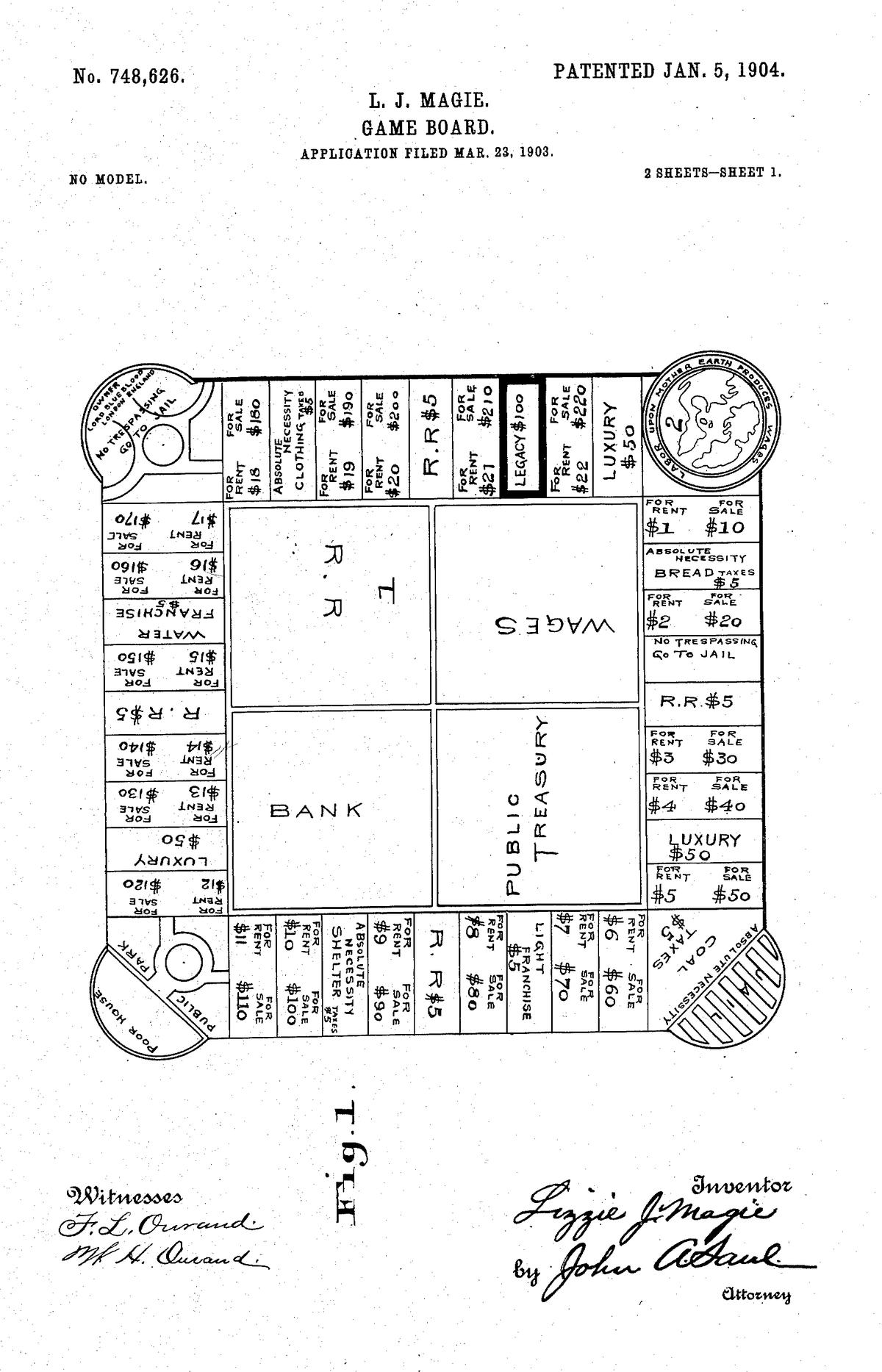[ad_1]
Madison Square, Fifth Avenue, Go To Jail, Grand Boulevard. Do these words and places ring any bells? Most of us would have stumbled upon them while playing the popular board game Monopoly. Imagine being a woman in the United States way before they got voting rights who worked hard to create a unique game to teach the negative outcomes of a monopolistic economy to the masses without much success. Fast-forwarding years, the board game went up to one of the most-loved household games to date without any credit given to the woman behind it. This is exactly what the inventor of Monopoly went through, unfortunately.
The mind behind the board
In 1866, in Macomb, Illinois, a daughter was born to James Magie, a newspaper publisher and an advocate of economic reform. Being an ardent fan of Georgism (idea based on the writings of Henry George, a political economist who argued that wealth inequality stemmed from land monopolisation and that land should be taxed heavily to prevent the concentration of wealth in the hands of a few), he had instilled the idea that inequality is one of the greatest threats in his child. This young girl grew up to be an independent and forward-thinking woman who was a strong advocate for economic and gender equality. This was Elizabeth ‘Lizzie’ Magie.
A Georgist since a young age, Magie loved to create board games that helped convey and educate major economic concepts to the masses. It was in 1903 that Magie designed The Landlord’s Game to illustrate the economic principles of Henry George. The Landlord’s Game also began as an illustration of the dangers of unchecked capitalism and monopoly power. The game had two sets of rules to help the players understand the aftermath of a monopolistic society. One encouraged monopolistic behaviour, while the other promoted a tax-based, anti-monopoly approach. Magie hoped that players would see the negative consequences of monopolistic practices and adopt a more equitable economic mindset.
Elizabeth ‘Lizzie’ Magie.
| Photo Credit:
Wikimedia Commons
She patented the game in 1904, making it one of the first board games designed by a woman to receive official recognition. She was part of the less than 1% of the female population who held a patent even before having the right to vote! Despite Magie’s best efforts to promote The Landlord’s Game, it failed to gain widespread commercial success. However, it did not go unnoticed. Over the next few decades, various versions of the game were copied and modified by different groups, including colleges and schools, who used it to teach economic principles.


“a practical demonstration of the present system of land-grabbing with all its usual outcomes and consequences. It might well have been called the ‘Game of Life,’ as it contains all the elements of success and failure in the real world.”Elizabeth Magie about her game ‘The Landlord’s Game’
The Landlord’s Game to Monopoly
Until the late 20th and early 21st Centuries, the same game under a different name—Monopoly— was credited to Charles Darrow. An unemployed salesman and a capitalism (an economic system that emphasises private ownership and profit) enthusiast, he came across a modified version of the original game at a social gathering and “reinvented” it by making additional changes like the introduction of fixed property names and a more polished design. He then further marketed it as a new game called Monopoly. In 1935, he sold the game to Parker Brothers, who, believing Darrow to be the sole inventor, promoted him as the genius behind the game’s success.
After acquiring Monopoly, Parker Brothers soon discovered Magie’s patent for The Landlord’s Game when people started reaching out, saying they had been playing the game for years. Realising the potential legal complications, they purchased Magie’s patent for $500. Magie, happy that her brainchild would finally reach the masses, accepted the deal, but she soon realised that her vision had been fully stripped away. The version of Monopoly that Parker Brothers produced glorified monopolistic wealth accumulation rather than critiquing it like how she originally invented it. In a 1936 interview with The Washington Post, she expressed her disappointment that a game she designed to warn against monopolies had become a celebration of capitalist dominance, with no reference to the Georgist ideology she wanted to pass on.
The one that stood out
Unlike most women of her era, she supported herself and didn’t marry until the age of 44. In addition to working as a stenographer and a secretary, she wrote poetry and performed comedic routines onstage. An anecdote popularly known about Magie is how fearless she was in standing up for her beliefs. Finding it difficult to support herself on the $10 a week she was earning, Magie staged an audacious stunt mocking marriage as the only option for women. She purchased an advertisement offering herself for sale as a “young woman American slave” to the highest bidder. The stunt shouted her political stand loudly as she said, “We are not machines. Girls have minds, desires, hopes and ambition.”

The truth comes out
It was in the 1970s that the involvement of Magie in creating Monopoly came out during a legal battle. Ralph Anspach, an economics professor and creator of the game Anti-Monopoly, was in a legal battle with the Parker Brothers when he discovered documents that traced Monopoly’s origins back to The Landlord’s Game. And that’s how the deceitful story behind the popular board game came about.
Today, Magie is slowly gaining recognition for her work, as historians acknowledge her as the true creator of Monopoly, and her contributions to economic education and game design are celebrated. Nevertheless, her story is a reminder of how women’s achievements have often been erased by history due to inequalities and the societal structures of the past and present.
niranjana.ps@thehindu.co.in
Published – April 01, 2025 12:00 pm IST
[ad_2]
Source link


